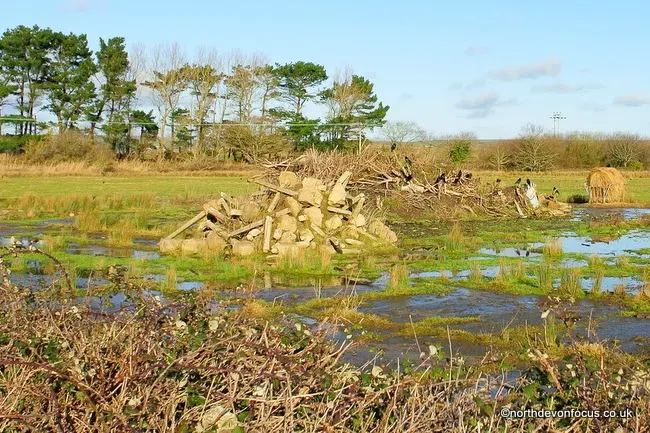January is nearly over and we still haven’t seen enough
light to take a decent shot, a sunrise or a sunset. Such a gloomy start to 2018
colourless, featureless skies and rain, rain, rain…..
A succession of storms hit the UK as the New Year was
heralded in with Storm Dylan followed in quick succession by Storm Eleanor on
the 3rd January then Storm Fionn on the 16th. The
constant roar of the wind, the sound of rain and hailstones lashing on the
window pane made for a disturbing night’s sleep. The downpours have continued, culminating
in flash flooding in parts of North Devon on the 21st January.
We were driving over to Exmoor, dodging stone-studded flooded
roads and diversions, driving up hill, as water cascaded from hedgebanks,
culverts and gullies beside the road, then down again motoring on slowly
through pools of water at the bottom of each hill. We passed swollen rivers,
fast-running streams and flooded fields and still it rained….we stopped briefly
at Simonsbath to take a shot of a wider than normal River Barle then headed out
over Brendon where the River Exe was just starting to bleed onto the road then
down to Malmsmead where Badgeworthy Water raced through the ancient packhorse bridge
and over the ford.
We saw very little wildlife on the way, a buzzard, an Exmoor
pony, head hung low, a few Ruby Red cattle and sheep of course all well prepared
for the harsh weather up on the moor with their natural, fluffy winter coats. Looking a
little less at home in the rain were a couple of horses over the fence standing
stock still in their man-made coats. This makes me realise how birds and
animals can fare well in bad weather with maybe just a little help from us
humans. Local farmers are out feeding their animals at all times of day even on
a Sunday and you too can do your bit by leaving food and water out for the birds and critters in the garden.
As January 2018 draws to a conclusion it’s once again time
for some colourful events starting with the RSPB Big Garden Birdwatch on 27th-29th January.
Stargazers enjoyed the first of two 2018
supermoons on 1st January. The next one is on the 31st
January, I am so hoping for a clear
star-lit night and no moor rain....!!!

The River Barle in flood at Simonsbath. Photo copyright B. Adams (All Rights Reserved)
River Exe heading for the road. Photo copyright Pat Adams (All Rights Reserved)
Free running Badgeworthy Water at Malmsmead - Photo copyright B. Adams (All Rights Reserved)

The Road Ahead. Flood waters 21st January 2018 Photo copyright Pat Adams (All Rights Reserved)
👀👀👀👀
Lunar Eclipse and Supermoon 2018
--------------
What is a Supermoon
“Some people will call the full supermoon on January 31 a Blue
Moon, too. That’s because it’ll be the second of two full moons in one
calendar month. Moreover, the January 31 supermoon will stage a total eclipse of the moon.” http://earthsky.org/space/what-is-a-supermoon
👀👀👀👀
Big Garden Birdwatch.
Join in, and count the wildlife that's counting on you.
Tap here for information/request a pack
Join in, and count the wildlife that's counting on you.
Tap here for information/request a pack











